
Douglas J. Den Uyl (born 1950) is vice president of educational programs at Liberty Fund. [1]

Douglas J. Den Uyl (born 1950) is vice president of educational programs at Liberty Fund. [1]
Den Uyl earned his B.A. from Kalamazoo College, his MA from the University of Chicago, and his Ph.D. from Marquette University. Den Uyl's areas of scholarly interest include the history of ideas, moral and political theory, and has published essays or books on Spinoza, Smith, Shaftesbury, Mandeville and others. He taught philosophy and was department chair and full professor at Bellarmine College (now Bellarmine University) before coming to Liberty Fund. [2] He is a member of the Mont Pelerin Society. [3] Den Uyl has contributed articles to journals such as Journal of the History of Philosophy, Social Philosophy and Policy, and Journal of Applied Philosophy, [4] as well as The Encyclopedia of Libertarianism. [5]
Den Uyl is the author of The Virtue of Prudence (1991), [6] The Fountainhead: An American Novel (1999), [7] and God, Man, & Well-Being: Spinoza's Modern Humanism (2008). [8]
Den Uyl coauthored (with Douglas B. Rasmussen) several books: Liberty and Nature: An Aristotelian Defense of Liberal Order (1991); [9] Liberalism Defended: The Challenge of Post-Modernity (1997); [10] and Norms of Liberty: A Perfectionist Basis for Non-Perfectionist Politics (2005). [11] He also co-edited (with Rasmussen) The Philosophic Thought of Ayn Rand (1984). [12]
A collection of scholarly essays about Rasmussen and Den Uyl's Norms of Liberty, Reading Rasmussen and Den Uyl: Critical Essays on "Norms of Liberty", edited by Aeon J. Skoble, was published in 2008. [13]

Alice O'Connor, better known by her pen name Ayn Rand, was a Russian-born American writer and philosopher. She is known for her fiction and for developing a philosophical system she named Objectivism. Born and educated in Russia, she moved to the United States in 1926. After two early novels that were initially unsuccessful and two Broadway plays, she achieved fame with her 1943 novel, The Fountainhead. In 1957, Rand published her best-selling work, the novel Atlas Shrugged. Afterward, until her death in 1982, she turned to non-fiction to promote her philosophy, publishing her own periodicals and releasing several collections of essays.
Objectivism is a philosophical system developed by Russian-American writer and philosopher Ayn Rand. She described it as "the concept of man as a heroic being, with his own happiness as the moral purpose of his life, with productive achievement as his noblest activity, and reason as his only absolute".
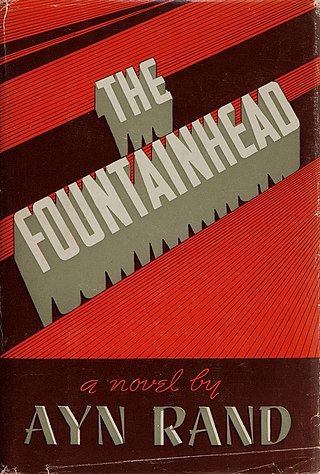
The Fountainhead is a 1943 novel by Russian-American author Ayn Rand, her first major literary success. The novel's protagonist, Howard Roark, is an intransigent young architect who battles against conventional standards and refuses to compromise with an architectural establishment unwilling to accept innovation. Roark embodies what Rand believed to be the ideal man, and his struggle reflects Rand's belief that individualism is superior to collectivism.
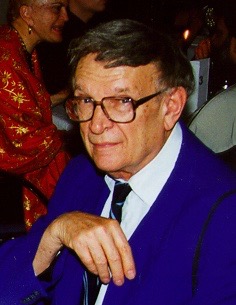
John Hospers was an American philosopher and political activist. Hospers was interested in Objectivism, and was once a friend of the philosopher Ayn Rand, though she later broke with him. In 1972, Hospers became the first presidential candidate of the Libertarian Party, and was the only minor party candidate to receive an electoral vote in that year's U.S. presidential election.
This is a bibliography for Ayn Rand and Objectivism. Objectivism is a philosophical system initially developed in the 20th century by Rand.
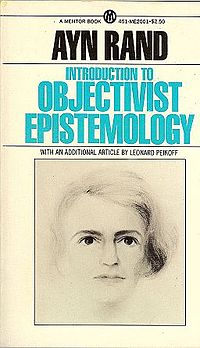
Introduction to Objectivist Epistemology is a book about epistemology by the philosopher Ayn Rand. Rand considered it her most important philosophical writing. First published in installments in Rand's journal, The Objectivist, July 1966 through February 1967, the work presents Rand's proposed solution to the historic problem of universals, describes how the theory can be extended to complex cases, and outlines how it applies to other issues in the theory of knowledge.

Chris Matthew Sciabarra is an American political theorist born and based in Brooklyn, New York. He is the author of three scholarly books—Marx, Hayek, and Utopia; Ayn Rand: The Russian Radical; and Total Freedom: Toward a Dialectical Libertarianism—as well as several shorter works. He is also the co-editor, with Mimi Reisel Gladstein, of Feminist Interpretations of Ayn Rand and co-editor with Roger E. Bissell and Edward W. Younkins of The Dialectics of Liberty: Exploring the Context of Human Freedom. His work has focused on topics including Objectivism, libertarianism, and dialectics.
The Objectivist movement is a movement of individuals who seek to study and advance Objectivism, the philosophy expounded by novelist-philosopher Ayn Rand. The movement began informally in the 1950s and consisted of students who were brought together by their mutual interest in Rand's novel, The Fountainhead. The group, ironically named "the Collective" due to their actual advocacy of individualism, in part consisted of Leonard Peikoff, Nathaniel Branden, Barbara Branden, Alan Greenspan, and Allan Blumenthal. Nathaniel Branden, a young Canadian student who had been greatly inspired by The Fountainhead, became a close confidant and encouraged Rand to expand her philosophy into a formal movement. From this informal beginning in Rand's living room, the movement expanded into a collection of think tanks, academic organizations, and periodicals.
Ayn Rand's philosophy of Objectivism has been and continues to be a major influence on the right-libertarian movement, particularly libertarianism in the United States. Many right-libertarians justify their political views using aspects of Objectivism.

Tibor Richard Machan was a Hungarian-American philosopher. A professor emeritus in the department of philosophy at Auburn University, Machan held the R. C. Hoiles Chair of Business Ethics and Free Enterprise at the Argyros School of Business & Economics at Chapman University in Orange, California until 31 December 2014.
The Randian hero is a ubiquitous figure in the fiction of 20th-century novelist and philosopher Ayn Rand, most famously in the figures of The Fountainhead's Howard Roark and Atlas Shrugged's John Galt. Rand's self-declared purpose in writing fiction was to project an "ideal man"—a man who perseveres to achieve his values, and only his values.

The Virtue of Selfishness: A New Concept of Egoism is a 1964 collection of essays by the philosopher Ayn Rand and the writer Nathaniel Branden. Most of the essays originally appeared in The Objectivist Newsletter. The book covers ethical issues from the perspective of Rand's Objectivist philosophy. Some of its themes include the identification and validation of egoism as a rational code of ethics, the destructiveness of altruism, and the nature of a proper government.
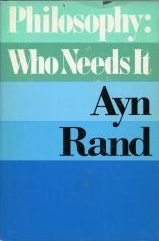
Philosophy: Who Needs It is a collection of essays by the philosopher Ayn Rand, published posthumously in 1982. It was the last book on which Rand worked during her lifetime.
Natural-rights libertarianism, also known as deontological liberalism, deontological libertarianism, libertarian moralism, natural rights-based libertarianism, philosophical libertarianism or rights-theorist libertarianism, is the theory that all individuals possess certain natural or moral rights, mainly a right of individual sovereignty and that therefore acts of initiation of force and fraud are rights-violations and that is sufficient reason to oppose those acts. This is one of the two ethical view points within right-libertarianism, the other being consequentialist libertarianism which only takes into account the consequences of actions and rules when judging them and holds that free markets and strong private property rights have good consequences.
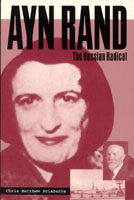
Ayn Rand: The Russian Radical is a 1995 book by Chris Matthew Sciabarra tracing the intellectual roots of 20th-century Russian-American novelist and philosopher Ayn Rand and the philosophy she developed, Objectivism.

Journals of Ayn Rand is a book derived from the private journals of the novelist and philosopher Ayn Rand. Edited by David Harriman with the approval of Rand's estate, it was published in 1997, 15 years after her death. Some reviewers considered it an interesting source of information for readers with an interest in Rand, but several scholars criticized Harriman's editing as being too heavy-handed and insufficiently acknowledged in the published text.

Douglas B. Rasmussen is professor of philosophy at St. John's University, where he has taught since 1981.

The Philosophic Thought of Ayn Rand is a 1984 collection of essays on Ayn Rand's philosophy of Objectivism, edited by Douglas Den Uyl and Douglas B. Rasmussen. It includes essays by nine different authors covering Rand's views in various areas of philosophy. The work received positive reviews, crediting it with bringing serious attention by philosophers to Rand and her work. However, reviewers also noted that the work assumed considerable prior knowledge of philosophy on the part of the reader.

Liberty and Nature: An Aristotelian Defense of Liberal Order is a 1991 political philosophy book by the philosophers Douglas B. Rasmussen and Douglas Den Uyl. Tom G. Palmer writes that Rasmussen and Den Uyl, who are influenced by Aristotle's Nicomachean Ethics, defend a version of "moral realism" and explore "the idea that rights are a requirement of the life of a living reasoning entity."

Norms of Liberty: A Perfectionist Basis for Non-Perfectionist Politics is a 2005 work of political philosophy by the philosophers Douglas B. Rasmussen and Douglas Den Uyl.